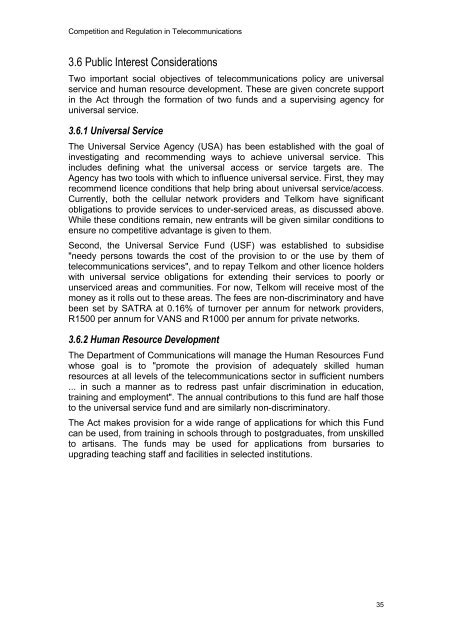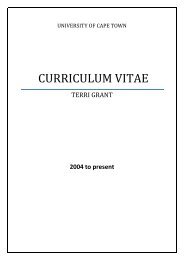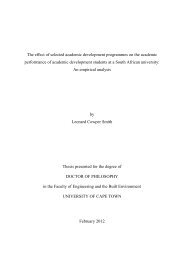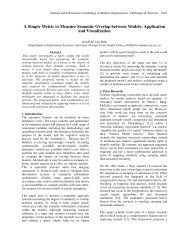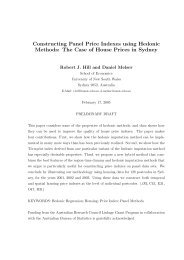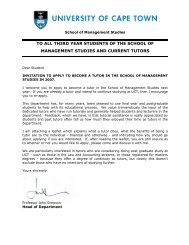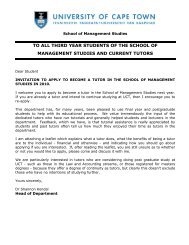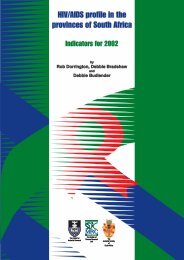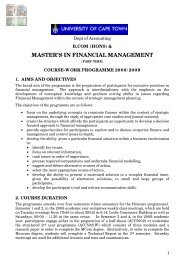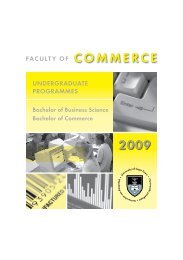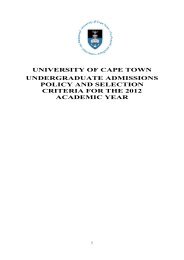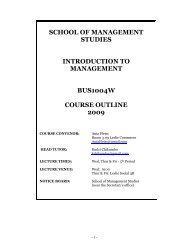Competition and Regulation in the Telecommunications Industry in ...
Competition and Regulation in the Telecommunications Industry in ...
Competition and Regulation in the Telecommunications Industry in ...
You also want an ePaper? Increase the reach of your titles
YUMPU automatically turns print PDFs into web optimized ePapers that Google loves.
<strong>Competition</strong> <strong>and</strong> <strong>Regulation</strong> <strong>in</strong> <strong>Telecommunications</strong>3.6 Public Interest ConsiderationsTwo important social objectives of telecommunications policy are universalservice <strong>and</strong> human resource development. These are given concrete support<strong>in</strong> <strong>the</strong> Act through <strong>the</strong> formation of two funds <strong>and</strong> a supervis<strong>in</strong>g agency foruniversal service.3.6.1 Universal ServiceThe Universal Service Agency (USA) has been established with <strong>the</strong> goal of<strong>in</strong>vestigat<strong>in</strong>g <strong>and</strong> recommend<strong>in</strong>g ways to achieve universal service. This<strong>in</strong>cludes def<strong>in</strong><strong>in</strong>g what <strong>the</strong> universal access or service targets are. TheAgency has two tools with which to <strong>in</strong>fluence universal service. First, <strong>the</strong>y mayrecommend licence conditions that help br<strong>in</strong>g about universal service/access.Currently, both <strong>the</strong> cellular network providers <strong>and</strong> Telkom have significantobligations to provide services to under-serviced areas, as discussed above.While <strong>the</strong>se conditions rema<strong>in</strong>, new entrants will be given similar conditions toensure no competitive advantage is given to <strong>the</strong>m.Second, <strong>the</strong> Universal Service Fund (USF) was established to subsidise"needy persons towards <strong>the</strong> cost of <strong>the</strong> provision to or <strong>the</strong> use by <strong>the</strong>m oftelecommunications services", <strong>and</strong> to repay Telkom <strong>and</strong> o<strong>the</strong>r licence holderswith universal service obligations for extend<strong>in</strong>g <strong>the</strong>ir services to poorly orunserviced areas <strong>and</strong> communities. For now, Telkom will receive most of <strong>the</strong>money as it rolls out to <strong>the</strong>se areas. The fees are non-discrim<strong>in</strong>atory <strong>and</strong> havebeen set by SATRA at 0.16% of turnover per annum for network providers,R1500 per annum for VANS <strong>and</strong> R1000 per annum for private networks.3.6.2 Human Resource DevelopmentThe Department of Communications will manage <strong>the</strong> Human Resources Fundwhose goal is to "promote <strong>the</strong> provision of adequately skilled humanresources at all levels of <strong>the</strong> telecommunications sector <strong>in</strong> sufficient numbers... <strong>in</strong> such a manner as to redress past unfair discrim<strong>in</strong>ation <strong>in</strong> education,tra<strong>in</strong><strong>in</strong>g <strong>and</strong> employment". The annual contributions to this fund are half thoseto <strong>the</strong> universal service fund <strong>and</strong> are similarly non-discrim<strong>in</strong>atory.The Act makes provision for a wide range of applications for which this Fundcan be used, from tra<strong>in</strong><strong>in</strong>g <strong>in</strong> schools through to postgraduates, from unskilledto artisans. The funds may be used for applications from bursaries toupgrad<strong>in</strong>g teach<strong>in</strong>g staff <strong>and</strong> facilities <strong>in</strong> selected <strong>in</strong>stitutions.35


